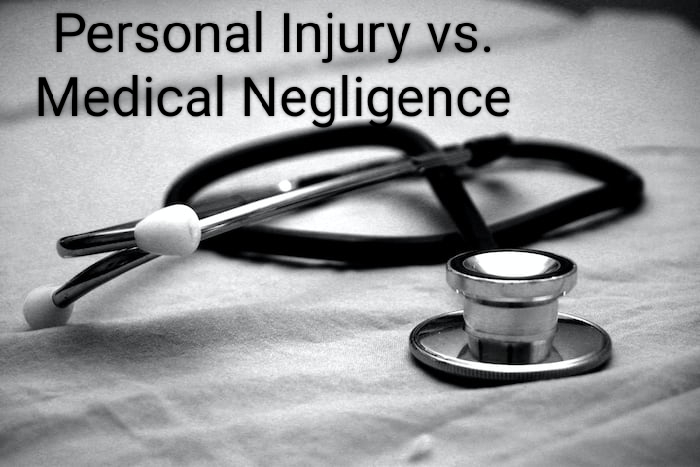If you have suffered an injury or illness due to the actions of a healthcare provider, you may be wondering whether you have a personal injury or medical negligence claim.
While these terms are often used interchangeably, they are distinct legal concepts with different requirements and implications.
Understanding the differences between personal injury and medical negligence can help you determine the best course of action for seeking compensation and justice.
Personal injury is a legal concept that covers a wide range of harm caused by the actions or negligence of another person or entity.
In the context of healthcare, personal injury claims may arise from incidents such as slip and falls in a hospital, medication errors, or physical assault by a staff member.
To succeed in a personal injury claim, you must prove that the defendant had a duty of care to you, that they breached that duty, and that this breach caused your injuries. Personal injury claims may result in compensation for medical expenses, lost wages, pain and suffering, and other damages.
Medical negligence, on the other hand, is a specific type of personal injury claim that arises from the actions or omissions of healthcare providers.
Medical negligence occurs when a healthcare provider fails to provide care that meets the accepted standard of care, resulting in harm to the patient.
To win a medical negligence claim, you must prove that the healthcare provider had a duty of care to you, that they breached that duty by failing to meet the standard of care, and that this breach caused your injuries.
Medical negligence claims may result in compensation for medical expenses, lost wages, pain and suffering, and other damages, as well as disciplinary action against the healthcare provider.
However, there’s a lot more differences and similarities between personal claim and medical negligence. In this article, we will delve deeper into personal injury vs. medical negligence.
Personal Injury
If you have been injured due to someone else’s negligence, you may have a personal injury case. Personal injury cases are civil lawsuits that seek compensation for harm caused by the defendant’s actions or inactions. In a personal injury case, the plaintiff must prove that the defendant was negligent and that the negligence caused the plaintiff’s injuries.
What is Negligence
Negligence is the failure to exercise reasonable care, resulting in harm to another person. Personal injury cases can arise from a variety of situations, including car accidents, slip and fall accidents, product liability, premises liability, and wrongful death claims. In a personal injury case, the defendant may be an individual, a business, or a government entity.
Types of Personal Injury Cases
There are many types of personal injury cases, but some of the most common include:
- Car accidents: When a driver’s negligence causes an accident that results in injuries to others.
- Slip and fall accidents: When a property owner’s negligence causes a hazardous condition that results in injuries to visitors.
- Motor vehicle accidents: When a driver’s negligence causes an accident involving a motor vehicle, such as a car, truck, or motorcycle.
- Product liability: When a manufacturer’s negligence causes a product to be defective, resulting in injuries to consumers.
- Premises liability: When a property owner’s negligence causes a hazardous condition on the property that results in injuries to visitors.
- Wrongful death claims: When a person’s negligence causes the death of another person.
Causes of Personal Injury Cases
Personal injury cases can be caused by a variety of factors, including:
- Negligence: When a person fails to exercise reasonable care, resulting in harm to another person.
- Intentional harm: When a person intentionally causes harm to another person.
- Strict liability: When a manufacturer is held responsible for injuries caused by a defective product, regardless of whether the manufacturer was negligent.
Damages in Personal Injury Cases
If you win a personal injury case, you may be entitled to damages, which are monetary compensation for the harm caused by the defendant’s negligence. Damages can include:
- Medical expenses: The cost of medical treatment for your injuries.
- Lost wages: The income you lost as a result of your injuries.
- Pain and suffering: Compensation for the physical pain and emotional distress caused by your injuries.
- Property damage: Compensation for damage to your property, such as your car.
In a personal injury case, the jury will consider the evidence presented by both sides and determine whether the defendant was negligent and whether the negligence caused the plaintiff’s injuries. If the jury finds in favor of the plaintiff, the plaintiff will be awarded damages.
If you have been injured in a personal injury case, it is important to consult with a personal injury lawyer who can help you navigate the legal process and ensure that you receive the compensation you deserve.
Medical Negligence
Medical negligence is a legal term that refers to a healthcare professional’s failure to provide the appropriate standard of care to their patient. In other words, it is when a healthcare provider fails to provide the same level of care that a reasonable professional in the same field would have provided in a similar situation. Medical negligence can occur in various forms, including misdiagnosis, surgical errors, and medication errors.
What Does Medical Negligence Involve?
Medical negligence is the failure of a healthcare provider to provide the appropriate standard of care to their patient. Medical negligence is the direct cause of harm, and the patient suffers damages that they can be compensated for.
For example, if a doctor misdiagnosed the flu, this could be medical negligence. But, if the doctor misdiagnosed a more serious illness, such as cancer, this would be medical malpractice.
Duty of Care
The duty of care is the legal obligation that healthcare providers have to their patients. It requires healthcare providers to provide a certain standard of care to their patients. The standard of care is determined by what a reasonable professional in the same field would have provided in a similar situation.
Breach of Duty
A breach of duty occurs when a healthcare provider fails to provide the appropriate standard of care to their patient. It means they have failed to meet the duty of care required of them. A breach of duty is a necessary element in proving medical negligence.
Causation
Causation refers to the link between the healthcare provider’s breach of duty and the harm suffered by the patient. It means that the healthcare provider’s actions or inactions directly caused the harm suffered by the patient.
Damages in Medical Negligence Cases
Damages in medical negligence cases refer to the harm suffered by the patient as a result of the healthcare provider’s breach of duty. Damages can include physical, emotional, and financial harm.
Medical Malpractice Cases
Medical malpractice cases are legal cases that arise from medical negligence. They are brought by patients who have suffered harm as a result of a healthcare provider’s breach of duty.
In a medical malpractice case, the plaintiff must prove that the healthcare provider breached their duty of care, and that the breach of duty directly caused the harm suffered by the patient.
In summary, medical negligence is a legal term that refers to a healthcare provider’s failure to provide the appropriate standard of care to their patient. It involves proving a breach of duty, causation, and damages.
Medical malpractice cases arise from medical negligence and require the plaintiff to prove that the healthcare provider breached their duty of care and caused harm to the patient.
If you believe you have been a victim of medical negligence, it is important to seek the advice of a qualified medical malpractice lawyer to determine your options and protect your rights.
Personal Injury vs. Medical Negligence
When it comes to legal claims related to injuries, there are two main categories: personal injury and medical negligence. While there are some similarities between the two, there are also key differences that are important to understand.
Key Differences
The main difference between personal injury and medical negligence is the context in which the injury occurred. Personal injury claims can arise from a wide range of situations, such as car accidents, slip and falls, or dog bites.
In these cases, the injury is typically caused by the negligence of another person or entity, such as a driver who was texting while driving or a property owner who failed to fix a dangerous condition.
On the other hand, medical negligence claims are specifically related to injuries caused by healthcare providers, such as doctors, nurses, or hospitals.
In these cases, the injury is typically caused by a failure to provide an appropriate standard of care, such as misdiagnosis, surgical errors, or medication errors.
Another key difference between personal injury and medical negligence claims is the burden of proof. In a personal injury case, the plaintiff must prove that the defendant was negligent and that their negligence caused the plaintiff’s injuries.
In medical negligence cases, the plaintiff must prove not only negligence but also that the negligence caused the plaintiff’s injuries and that the injuries would not have occurred otherwise.
Similarities
Despite these differences, there are also some similarities between personal injury and medical negligence claims.
For instance, both types of claims can result in compensation for the plaintiff, such as medical expenses, lost wages, and pain and suffering.
Furthermore, both types of claims require the plaintiff to prove their case using evidence such as medical records, witness testimony, and expert opinions.
Another similarity is that both personal injury and medical negligence claims can be resolved through settlement or trial. In some cases, the parties may be able to reach a settlement agreement without going to court. In other cases, the case may go to trial, where a judge or jury will determine the outcome.
Summary
In summary, while personal injury and medical negligence claims share some similarities, they are also different in important ways. If you have been injured and are considering legal action, it is important to understand which type of claim is appropriate for your situation.
YOU SHOULD ALSO READ:
- Medical Malpractice vs Professional Indemnity Insurance: The Key Differences
- Is RPOC Medical Negligence? Legal and Medical Implications
- Medical Malpractice vs Malfeasance: What are the Key Differences?
- How Long Can You Go Back to Claim Medical Negligence?
- Medical Law vs Ethics: Understanding the Key Differences












